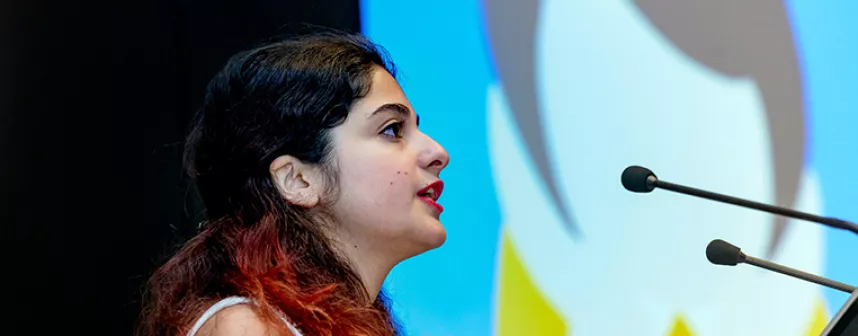Ayshan Aliyeva: a student with a passion for biochemistry and literature
May 20, 2019
Robots taking over the world, gluttonous zombies, scary aliens? This is not what Ayshan Aliyeva’s science fiction literature is about. "There are far too few texts about things that could actually happen from a scientific point of view," she says. The biochemistry student at Jacobs University Bremen is currently working on such a science fiction piece. It is about DNA and the ability of individuals to determine the genetic information of their offspring. "By describing realistic scenarios, I hope to be able to reduce fears and prejudices," she says.
As she could read at the age of five, the 19-year-old from Azerbaijan writes poems and short stories especially, which are published in her blog https://around-the-moon.webnode.com. When her studies allow it, she writes almost daily, preferably in cafés. Writing is a great way to express emotions, she says: "To create a world and then be able to live in it fascinates me". She also shares this fascination with others – in the "Dead Poets Society", a meeting of students interested in literature at Jacobs University.
Writing is one of her passions, another is biochemistry. Her mother, a microbiologist, always took Ayshan with her to the laboratory when she was a child. Ayshan found the apparatuses, the devices, and instruments exciting – but even more so, what can be achieved with them. "For me, it was always difficult just to believe. I wanted to know why something is the way it is. Science is the best way to do that". She is particularly enthusiastic about the way human cells function, "they are the key to understanding life.”
In a much-noticed speech at a joint event of the East Asian Association, Bremen’s Chamber of Commerce and Jacobs University, she spoke about science and literature, about things that don't seem to belong together and yet come together. Jacobs University inspires her, she says, because the university is the best example of unusual combinations: "So many nations, cultures, opinions, and religions come together on campus – not only does it work, but you profit from each other".
The scholarship holder of the Reidemeister & Ulrichs Foundation feels comfortable in an international environment, perhaps because she grew up at a crossroads of cultures between East and West, between Europe and Asia. "Most people do not know Azerbaijan. When I tell them that it lies between Russia, Turkey, and Iran, they are irritated because they do not bring these three countries together.” The former Soviet Republic stretches between the Caspian Sea and the Caucasus and is rich in oil. Ayshan grew up speaking three languages –Azerbaijani, Russian, Turkish, she is also fluent in German, English and speaks a little French.
She writes in English. She refined her language skills during a stay at Wake Forest University in North Carolina, USA, as a fellow of the Benjamin Franklin Transatlantic Relationship Program. From there she applied to Jacobs University together with a friend - both were accepted. She in biochemistry, her friend in physics.
This happened two years ago. Ayshan was 17 years then, and being away from the family was not easy. But she quickly acclimatized, also because she was involved in various areas activities: as a research assistant in Prof. Dr. Christian Hammann's biochemistry laboratory, for example, or as a student assistant in the International Office at Jacobs University.
Ayshan will complete her Bachelor's degree next year. Behavioral genetics is one of the topics she is interested in. Just like in the effect of intestinal bacteria, a relatively new branch of research that assumes that diseases such as diabetes or obesity are caused by microbes in the intestine. Material for a science fiction story, no doubt. Or for a Master's degree followed by a doctoral thesis. She does not yet know which option to choose. It is quite possible that she will take a year off to write.
This text is part of the series "Faces of Jacobs", in which Jacobs University introduces students, alumni, professors, and staff. Further episodes can be found at https://www.jacobs-university.de/faces
